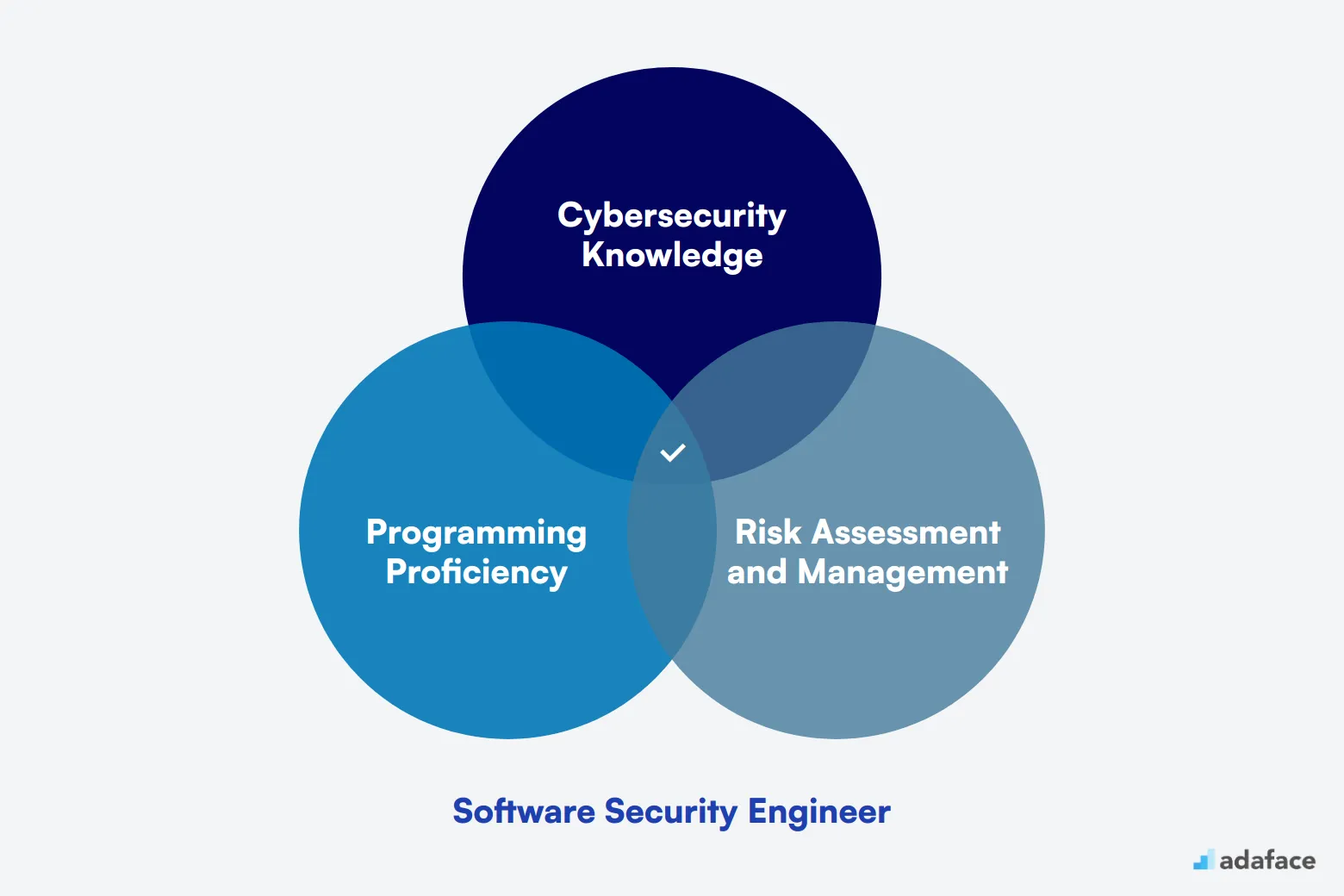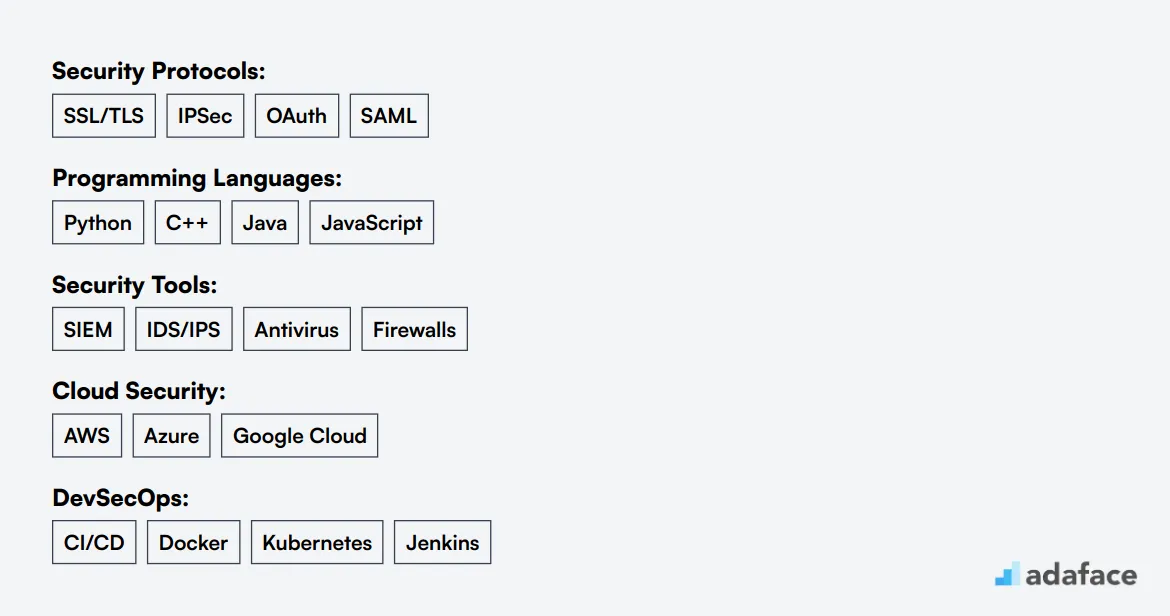As a hiring manager, securing your software systems is more critical than ever, making the role of a software security engineer indispensable. However, companies often fall short by not fully understanding the skill set required for this position, leading to potential security risks. A well-rounded software security engineer should possess not just technical prowess but also a keen understanding of the latest security trends and threats.
In this article, we provide a thorough guide on hiring software security engineers, including the necessary skills and qualifications to look for, platforms to find top talent, and structuring effective interviews. For more detailed job descriptions and roles, check our software security engineer job description.
Table of contents
Why Hire a Software Security Engineer?
Hiring a Software Security Engineer is crucial when your organization faces increasing cyber threats or struggles with secure software development. For instance, if your company has experienced data breaches or your applications have vulnerabilities, it's time to bring in an expert.
A Software Security Engineer can help by:
- Implementing robust security measures in your software development lifecycle
- Conducting regular security audits and penetration testing
- Developing and enforcing security policies and best practices
Before committing to a full-time hire, consider your company's size and specific security needs. For smaller organizations or short-term projects, working with a consultant might be more cost-effective. However, if security is an ongoing concern, hiring a dedicated Software Security Engineer is often the best long-term solution.

Skills and Qualifications to Look for in a Software Security Engineer
Crafting the ideal candidate profile for a Software Security Engineer can be tricky due to the rapidly evolving nature of security threats and technologies. Recruiters often struggle with balancing the technical skills required for the role with the specific needs of their organization. It's important to draw a clear line between what's required and what's preferred for your company to attract the right talent.
Here are some popular required and preferred skills and qualifications for this position:
- Required Skills and Qualifications:
- Bachelor's degree in Computer Science, Information Security, or a related field
- Minimum of 3 years experience in software security engineering or similar roles
- Strong understanding of security protocols, cryptography, and authentication
- Experience with security tools such as SIEM, IDS/IPS, and antivirus solutions
- Proficiency in programming languages such as Python, C++, or Java
- Preferred Skills and Qualifications:
- Master's degree in Cybersecurity or related discipline
- Certifications such as CISSP, CEH, or OSCP
- Experience with cloud security and platforms like AWS, Azure, or Google Cloud
- Knowledge of DevSecOps and CI/CD processes
- Familiarity with threat modeling and risk assessment techniques
You can explore more about these skills assessment tools to aid in evaluating potential candidates effectively.
| Required skills and qualifications | Preferred skills and qualifications |
|---|---|
| Bachelor's degree in Computer Science, Information Security, or a related field | Master's degree in Cybersecurity or related discipline |
| Minimum of 3 years experience in software security engineering or similar roles | Certifications such as CISSP, CEH, or OSCP |
| Strong understanding of security protocols, cryptography, and authentication | Experience with cloud security and platforms like AWS, Azure, or Google Cloud |
| Experience with security tools such as SIEM, IDS/IPS, and antivirus solutions | Knowledge of DevSecOps and CI/CD processes |
| Proficiency in programming languages such as Python, C++, or Java | Familiarity with threat modeling and risk assessment techniques |
How to Write a Software Security Engineer Job Description
Once you've defined the candidate profile, the next step is crafting a job description that attracts the right talent. Here are some quick tips to create an effective Software Security Engineer job description:
- Highlight key responsibilities and impact: Clearly outline the role's duties in safeguarding software systems and data. Mention specific security tools and methodologies they'll work with.
- Balance technical requirements with soft skills: List must-have technical skills like programming languages and security certifications. Also emphasize soft skills such as problem-solving and teamwork.
- Showcase your company's unique aspects: Highlight exciting projects, growth opportunities, or any special perks that set your organization apart in the cybersecurity field.
- Be clear about experience level: Specify the years of experience required and any industry-specific knowledge that would be valuable for the role.
Top Platforms to Hire Software Security Engineers
Now that you have a detailed job description, it's time to post it on job listing websites to attract qualified candidates. LinkedIn Jobs is a great place to start for full-time roles, while Dice caters specifically to tech jobs, making it ideal for software security positions. Indeed is another solid choice as it serves a broad spectrum of job categories, offering options to increase your post's visibility.
LinkedIn Jobs
Ideal for posting full-time positions and reaching a wide network of professionals. Allows detailed job descriptions and easy application process.

Dice
Specialized in tech jobs, including software security. Attracts candidates with specific skills in cybersecurity and software engineering.

Indeed
Large job board suitable for various types of positions. Offers options for sponsored listings to increase visibility of job postings.

Beyond these, platforms like Glassdoor can enhance your employer branding, and Upwork provides a pool of freelance talent for temporary needs. For developer-centric roles, consider Stack Overflow Jobs, and for startup environments, AngelList Talent is effective. Toptal and InfoSec Jobs offer specialized services for elite and niche security talent, respectively, while CyberSeek provides insights into the cybersecurity job market. For more insights on technical recruiting, explore our guide.
Keywords to Look for in Software Security Engineer Resumes
Resume screening is a critical first step in the hiring process for Software Security Engineers. It helps you quickly identify candidates with the right skills and experience, saving time and resources in the long run.

When manually screening resumes, focus on key technical skills and certifications. Look for keywords like 'cybersecurity', 'encryption', 'vulnerability assessment', and programming languages such as Python or Java. Also, keep an eye out for relevant certifications like CISSP or CEH.
To streamline the process, consider using AI-powered tools for resume screening. These tools can quickly analyze large volumes of resumes, matching them against your job requirements and providing you with a shortlist of top candidates.
Here's a sample prompt for AI-assisted resume screening:
TASK: Screen resumes for Software Security Engineer role
INPUT: Resumes
OUTPUT: For each resume, provide:
- Name
- Matching keywords
- Score (out of 10)
- Recommendation
- Shortlist (Yes/No/Maybe)
KEYWORDS:
- Security protocols (SSL/TLS, IPSec)
- Programming (Python, C++, Java)
- Security tools (SIEM, IDS/IPS)
- Cloud security (AWS, Azure)
- [DevSecOps](https://www.adaface.com/blog/devops-interview-questions/)
- Certifications (CISSP, CEH)
Recommended skills tests to screen Software Security Engineers
When hiring Software Security Engineers, using skills tests is a straightforward method to establish their expertise. These tests help ensure candidates have the technical skills necessary to protect and secure software systems. Here are our recommended tests:
Cyber Security Test: This test evaluates candidates' knowledge in securing networks and systems against cyber threats. It is crucial for assessing their ability to protect the software infrastructure.
Penetration Testing Test: Use this to determine if candidates can identify and exploit vulnerabilities in software systems. It is critical for ensuring systems' security and robustness.
Cryptography Test: This assesses candidates' understanding of encryption and data protection. Cryptography is a key component in safeguarding sensitive information.
Linux Online Test: As many security tools run on Linux, this test examines candidates' proficiency in Linux environments. It is essential for their role in managing security operations.
Network Engineer Test: Understanding network protocols and configurations is vital for security engineers. This test checks candidates' skills in designing and securing network systems.
Structuring Interview Stages for Hiring Software Security Engineers
Candidates who pass the skills tests should advance to technical interviews, where their hard skills are thoroughly examined. While skills tests are great for filtering out unfit candidates, technical interviews are key to identifying the best candidates suited for the role. This stage allows hiring managers to gauge a candidate's problem-solving abilities and technical expertise.
Here are some example interview questions to consider: How do you secure a software application against potential vulnerabilities? This question assesses a candidate's understanding of security fundamentals. Can you explain the process of a security audit? is useful for evaluating experience with security assessments. Describe a situation where you identified and mitigated a security threat. This tests practical experience in real-world scenarios. What are the key differences between symmetric and asymmetric encryption? gives insight into the candidate's grasp on cryptography. Lastly, How would you handle a security breach in a software system? helps understand their crisis management skills. For an exhaustive list of questions, explore software security engineer interview questions.
What are the ranks of Software Security Engineers?
Differentiating between the various ranks of Software Security Engineers can be challenging, as many terms overlap with roles in cybersecurity and software development. Understanding the hierarchy is important for recruiters and hiring managers to accurately define responsibilities and expectations for each position.
• Junior Software Security Engineer: This is an entry-level role where individuals are typically new to the field. They assist in identifying vulnerabilities, performing basic security assessments, and learning about security best practices under the guidance of more experienced engineers.
• Software Security Engineer: A mid-level position, Software Security Engineers are responsible for implementing security measures in software development. They assess security risks, conduct penetration tests, and work closely with development teams to integrate security into the software lifecycle.
• Senior Software Security Engineer: This role requires a higher level of expertise and experience. Senior Software Security Engineers lead security initiatives, mentor junior staff, and make critical decisions about security architecture and tools to be used across projects.
• Lead Software Security Engineer: As a lead engineer, this role involves overseeing a team of software security professionals. They develop comprehensive security strategies, coordinate audits, and ensure compliance with industry standards and regulations.
• Director of Software Security: A senior management position that focuses on overall security policy and strategy within an organization. Directors are responsible for aligning security objectives with business goals and managing budgets for security initiatives.
Hire the Best Software Security Engineers
Throughout this post, we've covered the importance of Software Security Engineers, key skills to look for, crafting effective job descriptions, and structuring interviews. We've also explored platforms for hiring and resume keywords to watch out for.
If there's one key takeaway, it's the value of using well-crafted job descriptions and appropriate skills tests to make your hiring process more accurate. By implementing these strategies, you'll be better equipped to find and hire top-notch Software Security Engineers who can safeguard your organization's digital assets.
Cyber Security Assessment Test
FAQs
A Software Security Engineer is responsible for ensuring that software applications are secure and protected from cyber threats by implementing security measures and testing systems for vulnerabilities.
Key skills include proficiency in programming languages, familiarity with security tools, knowledge of security frameworks and protocols, and strong problem-solving abilities.
An effective job description should clearly outline the responsibilities, required skills, and qualifications while also providing information about your company and the role's benefits.
You can find candidates on professional platforms like LinkedIn, specialized job boards, and at tech conferences and meetups.
Focus on technical questions about programming, cybersecurity scenarios, and problem-solving abilities, along with evaluating their familiarity with your specific security tools and platforms.
Use skills assessment tools and coding tests to evaluate their proficiency in security practices and problem-solving capabilities. Consider platforms like Adaface for conducting these assessments.
Interview stages typically include a phone screening, technical assessment, behavioral interview, and a final interview with key team members to ensure cultural fit.

40 min skill tests.
No trick questions.
Accurate shortlisting.
We make it easy for you to find the best candidates in your pipeline with a 40 min skills test.
Try for freeRelated posts
Free resources



